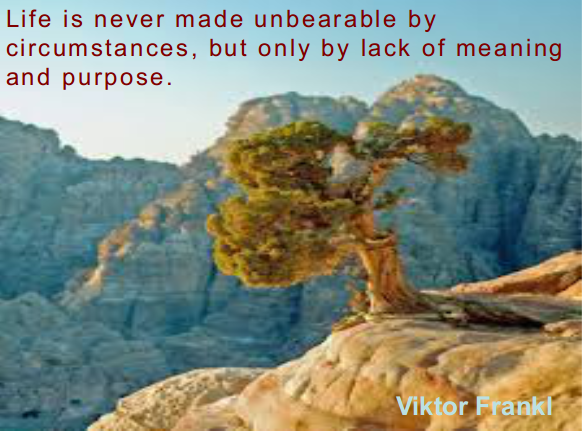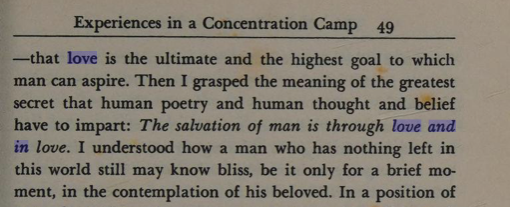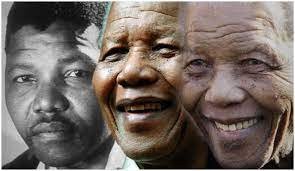
What is Logotherapy?
Developed by Viktor Frankl, the theory is founded on the belief that human nature is motivated by the search for a life purpose; logotherapy is the pursuit of that meaning for one’s life.
www.goodtherapy.org

Given that we are may well be facing a global catastrophe due to climate change and ecological collapse, it may well be worthwhile to learn from a thinker who tried and tested his psychotherapy through terrible experiences, and used it to greatly help himself and others .
Practice Questions – Guess first!
QUESTION 6
Frankl believed that youngsters often do not reach optimal levels of development because they ___________
- (a) are given responsibilities at a time when they need to have fun.
- (b) want to live only for today, without any goals or visions for the future.
- (c) so easily capitulate to peer and other outside pressures.
- (d) live in an existential vacuum, with too few challenges and goals.
The correct answer is:
- (1) (a) and (c)
- (2) (c) and (d)
- (3) (b), (c) and (d)
- (4) (a), (b), (c) and (d)
[democracy id=”1″]
Answer
Read the following story carefully and answer Questions 7 to 10.
When Anna received the devastating news that she had cancer, she immediately phoned those close to her and in this way, mobilized her social network. When she went for treatment at the clinic, she also connected with other sufferers and created a community of sufferers that gave those who were suffering the feeling that they were not alone. In reaching out to them, she found meaning in her own suffering. She was also able to focus on her ‘blessings’. When she looked at other sufferers who were having a far worse time than her. She sought knowledge through reading about cancer and healing and followed a healthy diet plan. She also sought to know why she became ill. She believed that it was due to issues in the past that she had not dealt with properly. She now took the opportunity she was given to deal with those issues and believed her cancer would not return. She now lives her life as a cancer survivor and has made many plans for her future.
QUESTION 7
In terms of Frankl’s theory regarding the freedom to be responsible, which of the following statements is/are true of Anna?
- (a) As a human being, she constantly faced choices in terms of her attitude towards her diagnosis of cancer and her experience of it.
- (b) She felt compelled to behave positively when she found out that she had cancer.
- (c) She would have to bear the consequences of the choices that she made towards her diagnosis of cancer and her experience of it.
- (d) Although she is primarily a spiritual being, her freedom of choice is nonetheless curtailed by her environment and heredity.
The correct answer is:
- (1) (a) & (c)
- (2) (a), (c) & (d)
- (3) (b) & (c)
- (4) (a), (b), (c) & (d)
[democracy id=”1″]
Answer
QUESTION 8
In terms of Frankl’s belief that humans live on a level beyond animal existence, Anna can ____________
- (a) live her life purposefully even though she has cancer.
- (b) take up the challenge that her cancer has presented to her.
- (c) rise above her present situation and do something about it.
- (d) change her environment by making choices.
The correct answer is:
- (1) (a), (b), (c) & (d)
- (2) (c) & (d)
- (3) (a), (b) & (c)
- (4) (a) & (d)
[democracy id=”1″]
Answer
QUESTION 9
In terms of Frankl’s theory, which of the following statements are true regarding Anna’s will to meaning?
- (a) Cancer gave Anna’s life meaning.
- (b) She took up the challenge to be victorious despite her cancer by being proactive in many areas of her life.
- (c) She wants to become healthy again and uses her will to carry on believing that she will survive cancer, and she dismisses any negative thoughts.
- (d) If her illness deteriorates, she may be hampered in her search for meaning as her physical survival might then become her priority.
The correct answer is:
- (1) (a), (b), (c) & (d)
- (2) (b) & (d)
- (3) (a) & (c)
- (4) (a) & (d)
[democracy id=”1″]
Answer
This one is tricky again.
A is true. “she found meaning in her own suffering“, so cancer did give her life meaning. Therefore 1, 3 or 4 could be correct.
B is true. She has decided to create a victorious future for herself and is very proactive. “has made many plans for her future” This would mean that only 1 could be correct.
C is partially true. She does set survival as a goal, “believed her cancer would not return” but nowhere does it say she dismissed all negative thoughts.
D is true according to the textbook. Although I disagree with this interpretation.
QUESTION 10
In terms of Frankl’s theory, it is possible to assume that Anna has attained optimal development because _______.
- (a) she exercised her freedom of will and found meaning in her life.
- (b) she accepted the factuality of life and her actions are self-determining.
- (c) she lives her life in terms of self-transcendence.
- (d) she is actively future directed and therefore would regard death as a failure.
The correct answer is:
- (1) (a), (b) & (c)
- (2) (b) & (d)
- (3) (a), (c) & (d)
- (4) (a) & (d)
[democracy id=”1″]
Answer
Death is inevitable and so cannot be sensibly seen as a failure. #freedom-of-will
Dr Frankl trained under Sigmund Freud and under Alfred Adler.
However he felt that Freud put too much emphasis on the will to pleasure.
He also opposed mechanist and depersonalized explanations of human behaviour and human nature such as behaviourism – even as a child at school.
And that Adler over-emphasised the will to power.
He felt that people were primarily driven by the will to meaning.
Existential Psychology
A system in psychology focused on the belief that the essence of humans is their existence. … This is a process that seeks meaning within the whole of the person’s existence, including the client’s personal history.
Jrank: Existential psychology
Underlying assumptions
- People have freedom to choose and ultimate responsibility for their choices.
- We are spiritual beings, not animalistic machines
- True fulfilment is about fulfilling a higher purpose. Unlike animals we can rise about our situation.
- We can change our environment
- We can change ourselves.
- We want to live for a purpose greater than ourselves – such as love for someone else, or to do good, or for a greater cause.
- Life has inherently got meaning – we discover meaning.
- Conscience tells us what is the right thing to do – this calls us towards acting meaningfully.
- There are inherently higher values and meanings.
- So conscience is transcendent – it connects us to a truth that is greater than self-interest or an aspect of self.
- Each person has to discover meaning for themselves – genuine religion is existential, not simply taken on passively from dogma.

Taken from a blog by Dr Paul Wong Positive Psychology and Logotherapy.
The structure of the personality
We have 3 aspects:
- The physical
- The psychological
- The spiritual – we are spiritual beings. Therefore we are free, not determined by the physical or psychological.

The dynamics of the personality
Frankl focussed on spiritual dynamics (Noodynamics) rather than psychodynamics.
Since we have genuine free will and are meaning-orientated the dynamics of the personality are based on:
- The freedom of the will: From moment to moment we have free will. We cannot pretend that we do not. Of course our freedom is limited by our options and situations. But we can still make choices to act or not, and what to do.
- The will to meaning: People long to have meaning in their lives. It is our most basic motivation. In adverse conditions, people without meaning do not survive. In comfort and affluence, people without meaning begin to suffer from spiritual depression or neurosis. So Frankl rejects Maslow’s hierarchy of needs. Meaning is always the primary need.
- Meaning is more important than happiness. People who simply seek happiness can never be satisfied, because true happiness comes from attaining meaning. Otherwise life is empty.
- In the same way, setting a clear conscience or self-actualisation as a goal is empty.
- We need to have a purpose greater than ourselves -beyond our own needs and wants in order to be fully alive and engaged with life.
- So the will to pleasure and the will to power are signs of existential emptiness – they are false substitutes for the will to meaning. They are symptoms of a frustrated will to meaning, as would be various addictions.
- The meaning of life: There are three principal ways we can find meaning in our lives.
- Creative values: The personal goal of contributing through creating something new or beautiful.
- Experiential values: The appreciation of goodness, beauty, truth in our world around us. Love is an experiential value. A deep appreciation of the person that we love.
- Attitudinal values: All people cannot avoid the experience of
- suffering
- death
- guilt
“To live is to suffer. To find meaning in life is to find meaning in suffering.”
So although we have no freedom to avoid suffering, we have freedom to find meaning in suffering. We can change our attitudes.
It is here that we en- counter the central theme of existentialism: to live is to suffer, to survive is to find meaning in the suffering. If there is a purpose in life at all, there must be a purpose in suffer- ing and in dying. But no man can tell another what this purpose is. Each must find out for himself, and must accept the responsibility that his answer prescribes. If he succeeds he will continue to grow in spite of all indignities. Frankl is fond of quoting Nietzsche, “He who has a why to live can bear with almost any how.”
From the preface of Man’s Search for Meaning by Gordon W. Allport

The development of the personality
- The core of the personality is already present at birth.
- We become and grow continuously through life through our choices
- The young child is pleasure-seeking, and the adolescent is often power-seeking. Achieving adulthood is partially a process of outgrowing these goals, and searching for meaning in our lives.
- So you can see a person as a time-gestalt, meaning that a person is an entity that comes into full existence over time.

Optimal development
We obtain optimal development when we function at a spiritual level. This takes great courage and is relatively rare.
- determine their own actions and choose how to behave
- are fairly objective and realistic
- can use humour to create distance from suffering and laugh at themselves.
- outward-looking and dedicated to an external set of goals.
- future directed
- Work is a vocation
- Appreciate goodness, beauty and truth
- Respect and appreciate others as individuals.
- Can find meaning in the midst of suffering.
Psychopathology
2 important ideas brought to psychopathology from Frankl’s logo therapy:
The Noogenic Neurosis
“Most people do not reach optimum development because they lack the courage to respond to the challenge of life to exercise their freedom responsibly.”
Personology: From individual to ecosystem
When people don’t strive for, and put meaning first, they become empty, depressed, neurotic – even to the point of committing suicide. Which Dr Frankl worked with specifically in the 1920’s. And of course striving for empty pleasures and empty power.
When the whole society lacks meaning, a collective neurosis arises.
- An unplanned day-to-day existence: no aims, no purpose
- Fatalism: Feeling helpless and victimised by circumstances
- Conformism: people just try to be like everyone else – the don’t try to be authentic
- Totalitarianism: People are told what to do, what to believe and how to act. People can blindly follow and get told what to value.
The Human Dignity of Psychiatric Patients
Psychosis or mental problems do not diminish the human spirit. “The nucleus of man remains indestructible.” So logotherapy is very good for restoring dignity to people who have been seen as lesser or deficient in some way.
Applications:
You can test your own sense of purpose here: Purpose in Life Quiz.
Logotherapy
Logotherapy is meaning-based therapy.
Logotherapy calls on people to choose to step up and shoulder responsibilities and higher purpose in their lives, such as caring for others or serving a greater good.
It encourages people to turn their attention from their anxieties and internal focus on their sufferings to the outside world and to meaningful goals.
1. Socratic dialogue
Frankl would sometimes ask his clients, “Why don’t you commit suicide?” to uncover what the reason for their lives might be.
So logotherapy engages with clients through a socratic dialogue to help them understand and discover the meaning of their lives.
Socratic dialogue is a tool used to help you through the process of self-discovery by noticing and interpreting your own words. During Socratic dialogue, your therapist listens closely to the way you describe things and points out your word patterns, helping you to see the meaning in them.
Verywellmind.com
2. Humour
If you have been through very difficult times, you may have noticed that laughing and seeing the funny side of very terrible situations can be very helpful.
Humor was another of the soul’s weapons in the fight for self-preservation. is well known that humor, more than anything else in the human make-up, can afford an aloofness and an ability to rise above any situation, even if only for a few seconds.
Man’s search for meaning
3. Paradoxical intention
Humour is related to paradoxical intention. If you dread always making the same mistake, then try deliberately to make it. If you dread making a fool of yourself in public, then set out to make your fears come true. This disarms your fear in three ways. Firstly, it is quite hard to make it actually happen, and secondly, when it does, you have succeeded instead of failing, so it loses its charge – its power to trigger you. Thirdly, it is absurd, and therefore amusing.
4. Dereflection
Dereflection is deliberately not paying attention to a problem. An itch is normally not even a noticeable sensation, but when you focus on it, it becomes unbearable. Similarly, even quite strong pain diminishes when you take your attention away from it.
Humor, paradoxical intention and dereflection are useful techniques to give rise to two important spiritual abilities:
- Self-detachment: Distancing yourself from your problems and also from your self-image.
- Self-trancendence: Focussing your attention on a greater meaning beyond your self
These abilities help to give you an existential reorientation.
Note that both have to be done freely, without external pressure to conform to exhortations from others.
Education
Youngsters need to be challenged to discover the meaning of their lives, and to take on responsibilities so they create value for themselves.
Simple permissiveness gives rise to a meaningless existence with arbitrary, aimless purposelessness.
Aggression
Having experienced some of the darkest and most horrific human acts, Dr Frankl agreed with Freud and accepted the idea that evil and aggression are inherent aspects of human nature.
Life in a concentration camp tore open the human soul and exposed its depths. Is it surprising that in those depths we again found only human qualities which in their very nature were a mixture of good and evil? The rift dividing good from evil, which goes through all human beings, reaches into the lowest depths and becomes apparent even on the bottom of the abyss which is laid open by the concentration camp.
Man’s search for meaning
He also accepts the behaviourist idea that we are shaped by our environments.
However we still have the freedom and ability to overcome our aggression, and to change our environment for the better.
In the camps, some prisoners and guards became extremely sadistic and did terrible things. Other prisoners and guards chose to be brave, unselfish, kind and to do good in the same circumstances.
everything can be taken from a man but one thing: the last of the human freedoms—to choose one’s attitude in any given set of circumstances, to choose one’s own way.
Man’s search for meaning
So whether a person becomes a saint or a monster is a matter of the choices they have made.
More Questions for practice
QUESTION 6
What do you long for in your life? What are your prospects for the future? In considering the answer to these questions, which of the following ideas correspond to what Viktor Frankl had to say on these subjects?
- (a) To gain optimum security and a sense of belonging to a group, religion, nation or country which one has designated as one’s own, is the foothold we all need to feel optimally happy and satisfied.
- (b) To do your own thing, at your own discretion, time and to your own personal liking, even if it upsets the apple cart, or goes against the grain of what your family, religion or group want of you, is the only way to feel good about yourself.
- (c) The greatest challenge is to live with uncertainty and to realise that you are not the complete master of your own destiny.
- (d) The secret of human fulfilment is to discover where you are needed and to give of yourself even if this, at times, depletes, depresses or exhausts you.
The correct answer is:
- (1) (c) & (d)
- (2) (a) & (c)
- (3) (b) & (d)
- (4) (a) & (d)
[democracy id=”1″]
Answer
2 of these are faults not virtues. #noogenic-neurosis
QUESTION 7
You may have considered the impact of your childhood experiences on the shaping of your personality and how it still impacts on your present life and your views of the future. Considering Frankl’s views on the dynamics of the personality, which of the following statements correctly reflect/s what he believed?
- (a) We are not absolutely free. Our freedom is contained in what we do with the influences we have undergone and the circumstances in which we have been placed. #freedom-of-will
- (b) Human freedom means that we have the power to disregard the unhappy things we suffered in our formative years and that we can triumph in total victory over it all. #Frankl-aggression
- (c) It is possible that childhood influences could have been so bad, hardships so severe or an illness so devastating, that we experience ourselves as helpless to do anything about it. #freedom-of-will
- (d) The true view of what it means to be human cannot be found in averages since those who reach full human stature in manifesting what human beings are capable of, are in the minority. #Frankl-optimal-development
The correct answer is:
- (1) (a) & (c)
- (2) (a), (b) & (d)
- (3) (b)
- (4) (a), (c) & (d)
[democracy id=”1″]
Answer
A and D are correct. B and C are ambivalent. Both are possible.
QUESTION 8
How strongly does religion feature in your life? What views do you hold as a result of your religious mind-set? Which of the following views, that may or may not reflect your own views, correspond to the views held by Frankl?
- (a) Religion is a conscious commitment, and only those who have committed themselves in such a conscious way are included in the community of true believers.
- (b) Everyone relates to God or to a Higher Power, whether this relationship is expressed consciously or is unconscious and also whether this relationship is a positive or a negative one (e.g. expresses itself in faith in the existence of God or in a denial of such existence).
- (c) If we are convinced of the truth of our particular religious persuasions, it is our duty to persuade others to believe likewise.
- (d) Unconditional faith in the unconditional meaningfulness of life allows us to say: Yes! To life under all circumstances, even the incomprehensible ones.
The correct answer is:
- (1) (a) & (c)
- (2) (a) & (d)
- (3) (b) & (d)
- (4) (a), (c) & (d)
[democracy id=”1″]
Answer
C is definitely not what Frankl believed. So we need to choose between A and B. “Religion is genuine only where it is existential, where we commit ourselves to it by freely choosing to be religious.” Meyer et al
QUESTION 9
We live in a world that is highly competitive. It is also a world that sharply distinguishes between the haves and the have not or the achievers and the non-achievers. What ideas have you developed and what beliefs do you hold with regard to your own position in life? Indicate which of these ideas and beliefs corresponds to the views of Frankl.
- (1) Success is a measure of your worth as a person. Failure is the experience of the weak and the inadequate.
- (2) Every person has a destined role to play. The secret is to discover what life requires of us and to do it, no matter what it brings in its wake.
- (3) Every person should strive to actualise whatever potential and talent he or she has. The highest goal in life is self-actualisation.
- (4) The law of nature is the law of human society as well: it is the fittest that survive or make it in this world.
[democracy id=”1″]
Answer
QUESTION 10
There may have been times in your life that you felt extremely anxious. Virtually all you could think about was how to protect or somehow defend yourself against what you were experiencing. Which of the following statements would fit what Frankl had to say about such situations in the lives of human beings?
- (a) Freedom of choice only operates when we are in situations of relative safety and security.
- (b) The most effective way of dealing with extreme stress is to back away or withdraw from confrontation with the problem or situation causing the stress and to find relieving ways or techniques of coping with it.
- (c) The greatest sense of triumph and joyous relief comes from the realisation that we are not the hapless victim of circumstances but that, even in the worst situations, we still have the freedom to determine what kind of person we are going to be in the face of the stressful situation.
- (d) Like the animal, we as human beings have strong survival instincts which can prompt us, under extreme situations, to act in ways that under other circumstances we will not think of doing (e.g. in securing our own safety at the cost of others; in being deceitful, even in stealing or, at the extreme, plotting the downfall or even killing those whom we feel are a threat to us).
The correct answer is:
- (1) (c) & (d)
- (2) (a) & (d)
- (3) (c)
- (4) (a) & (b)
[democracy id=”1″]
Answer
C is definitely true, so we have a choice between C on its own and C with D. #Frankl-aggression

